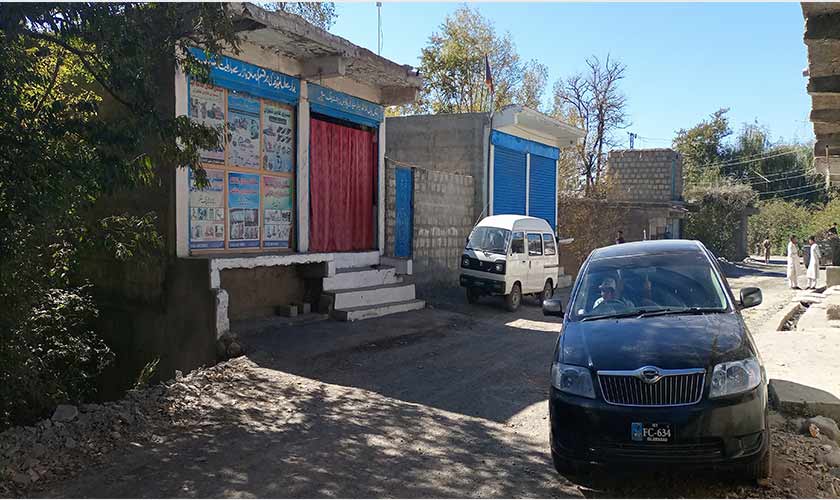By Muhammad Daud Khan
The women of Parachinar have found empowerment through women-owned businesses.
Standing on a roadside, I was waiting for the male interviewee who had established a shop for his sister. Two women opened the door of a black Toyota Fielder and entered a shop, where a red curtain was drawn. The women had come at a shop owned and run by a woman.
Shalozan, one of the most populated villages in Upper Kurram, at a distance of 10 kilometres from Parachinar city, is where the men have empowered women. They have helped women establish shops attached to their homes.
In the last 20 years, the number of shops run by women has been increasing. The village has at least 13 female-run shops now. The men are of the view that with growing population, awareness and girls’ education, the number of female shops, commonly known as “women shopping centres” will further increase in the Kurram tribal district.
Ashiq Hussain, 55, a father of seven daughters in Shalozan, has established a shop for one of his daughters. The shop is attached to their home and has two doors; one opens towards the street, the other into the home. The shop is clean, full of women’s and children’s clothing, bags, shoes, make-up and other items. “We invested three hundred thousand rupees, but in a year-and-a-half the shop has raised well over a million“, he says.
Ashiq Hussain never attended school. In the patriarchal setup of Tribal Areas, fathers take pride in having a male heir, but Ashiq is a proud father of daughters. Many people now know him because of his eldest daughter.
Shattering stereotypes
He has also transformed his stable into a shop. One of his daughters, a college student, who has completed a beauty parlour course in Peshawar, is running the shop, teaching the tricks of the trade to local girls. The father helps the daughter coordinate with vendors in Peshawar, “my wife and I look after the shop while our daughter goes to college in the morning. When she returns, she takes charge,” he says.
Some thirty years ago, women did not have much agency, Ashiq remembers. They would need a male member from the family to accompany them even to the local market. “Now, the women of our village have many options. They can now get everything in the village at their doorstep,” he adds.
Compared to the other six tribal districts in Khyber Pakhtunkhwa, men in Parachinar are cooperative and encourage women start-ups. These shops have empowered the tribal women who once had few opportunities to grow and find financial stability.
“When I was young, we lived in poverty. Men were responsible for feeding entire families. Now, women are supporting men in every field, and the quality of life has improved,” he adds.
Rehmat Hussain, established a women’s shopping centre for his wife and sister in Shalozan twenty years ago. Compared to Peshawar and other cities, Parachinar is expensive. “When my family shopped in Peshawar and compared the rates with the local market, we found that Parachinar shopkeepers were selling items at a higher price. My sister came up with the idea of setting up shops run by women in the village. The idea worked. Now they purchase materials for women from Peshawar to sell in the village,” says Rehmat.
Rehmat had invested fifty thousand rupees at the start. After 20 years, the women shopping centre is worth five million. “My sister purchases women’s clothing, make-up and other items from Peshawar-based vendors. I support them as help with the logistics,” he says.
Running a women’s shop in a tribal district comes with many challenges. “When we buy items in Lahore, where most of the vendors sell locally produced items, we do not face logistical issues. But in Peshawar, a majority of vendors deal in items made in China and Korea, mostly non-custom paid. Due to official restrictions we are then unable to take these to Parachinar,” he adds.
The Khyber Karobar Support Programme and Insaf Rozgaar Scheme are two flagship programmes launched by the Khyber Pakhtunkhwa government. The government is encouraging women entrepreneurs in seven tribal districts to apply for loans. In Kurram, under the Insaf Rozgaar Scheme, a total of 31 women have benefitted so far. A majority of women in the area have set up start-ups and small shops at home. A few have opened salons.
The Bank of Khyber (BOK) has established a dedicated micro finance department in KP, which is facilitating socio-economic development through increased access to financial services. According to BOK open-source data, it has disbursed Rs 1.3 billion in loans to more than 27,000 borrowers. A majority of the loans are below Rs 50,000 per client. Akhuwat has also established a centre in Parachinar and provides small interest-free loans to local women.
Nasir Hussain, a father of three, says, “my wife and other women in the family shop in the village. These women shops facilitate them. Now they can buy anything, and they no longer need to visit city markets for latest trends.”
Haji Gulfam Hussain, a former president of the Parachinar Trade Union, says that in Upper Kurram, out of a total of 8,000 shops, 600 are owned and run by women. “We are proud of our women who now work shoulder to shoulder with men. Education has broadened the minds of our men, who now encourage women to work,” he adds.
https://www.thenews.com.pk/tns/detail/917819-shattering-stereotypes


No comments:
Post a Comment